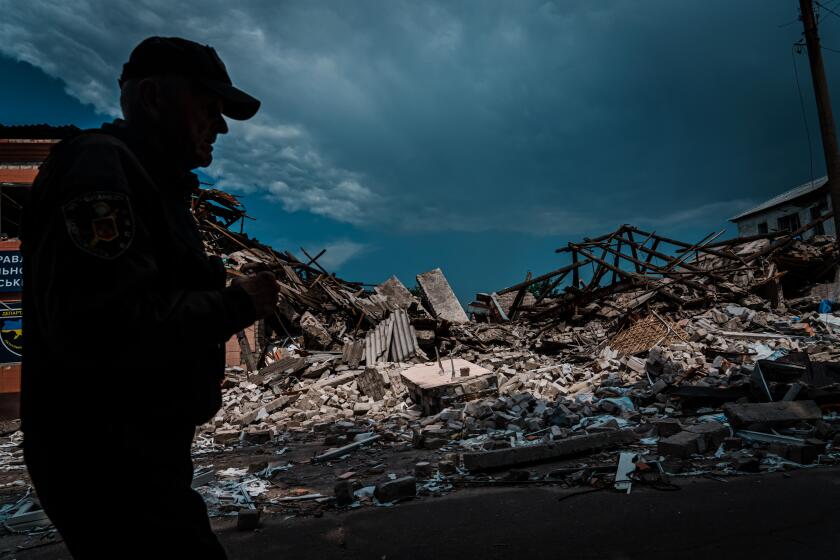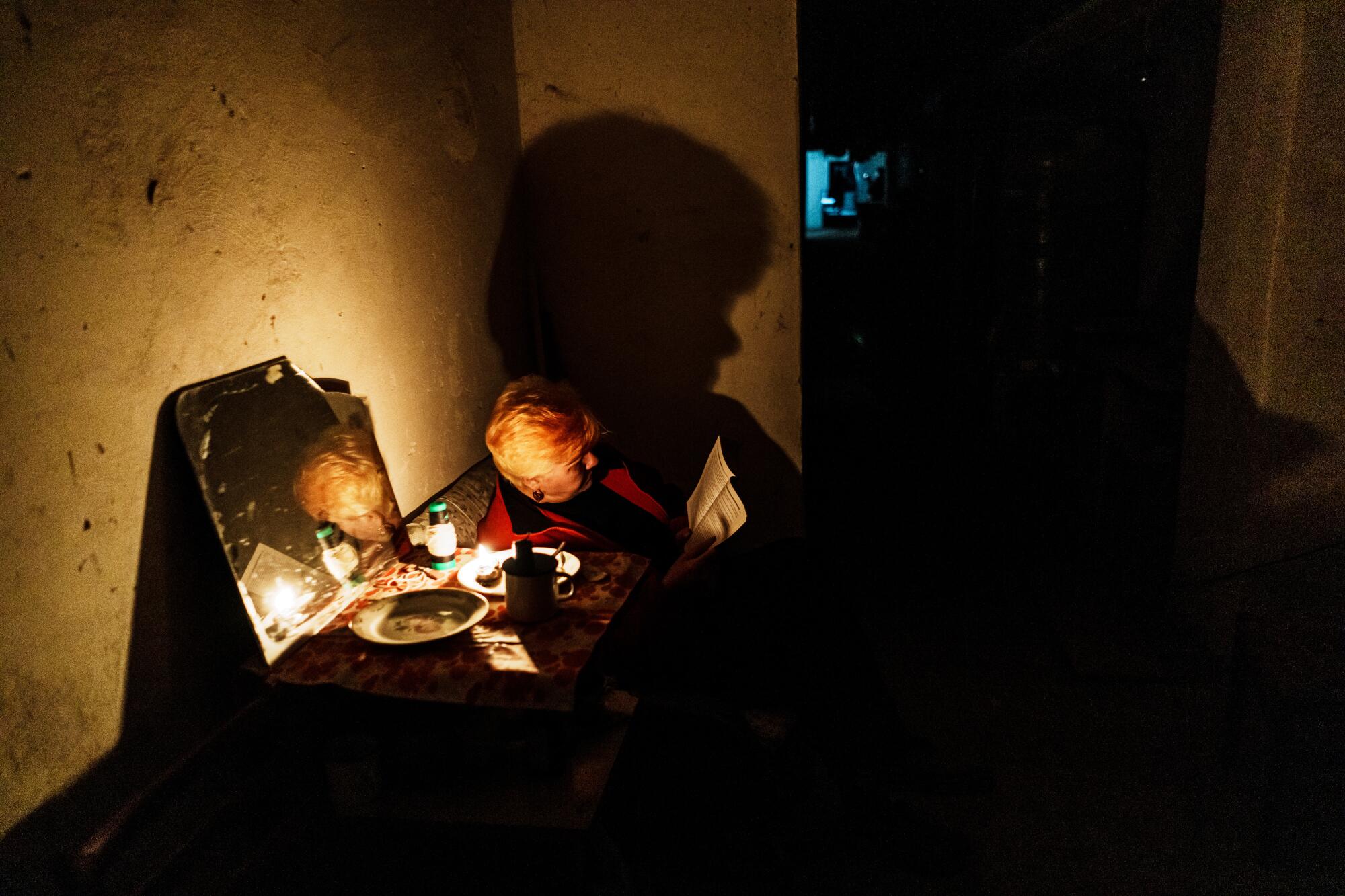
- Share via
LYSYCHANSK, Ukraine — In Russian, the word “molodetz” roughly translates to “good job” or “bravo,” and that’s what 75-year-old Leonid was saying as he pointed at the Russian artillery’s handiwork — the wreckage of a bombed-out building in a central street of Lysychansk in eastern Ukraine.
“The Ukrainian soldiers, they’re bad people, cowards,” added the retired security guard, who, like others, asked that his last name not be used for reasons of privacy. “They hide here, and then the moment the attack happens they run away.”
His attitude demonstrated that in this part of the country, now the focal point of Moscow’s invasion that began in late February, the Ukrainian army is not necessarily fighting on friendly ground.
At the outset of the war, Russian planners unleashing forces on Kyiv, the Ukrainian capital, expected a populace that would celebrate their arrival, welcoming them as liberators from what the Kremlin without basis insisted was a neo-Nazi regime holding its subjects hostage.
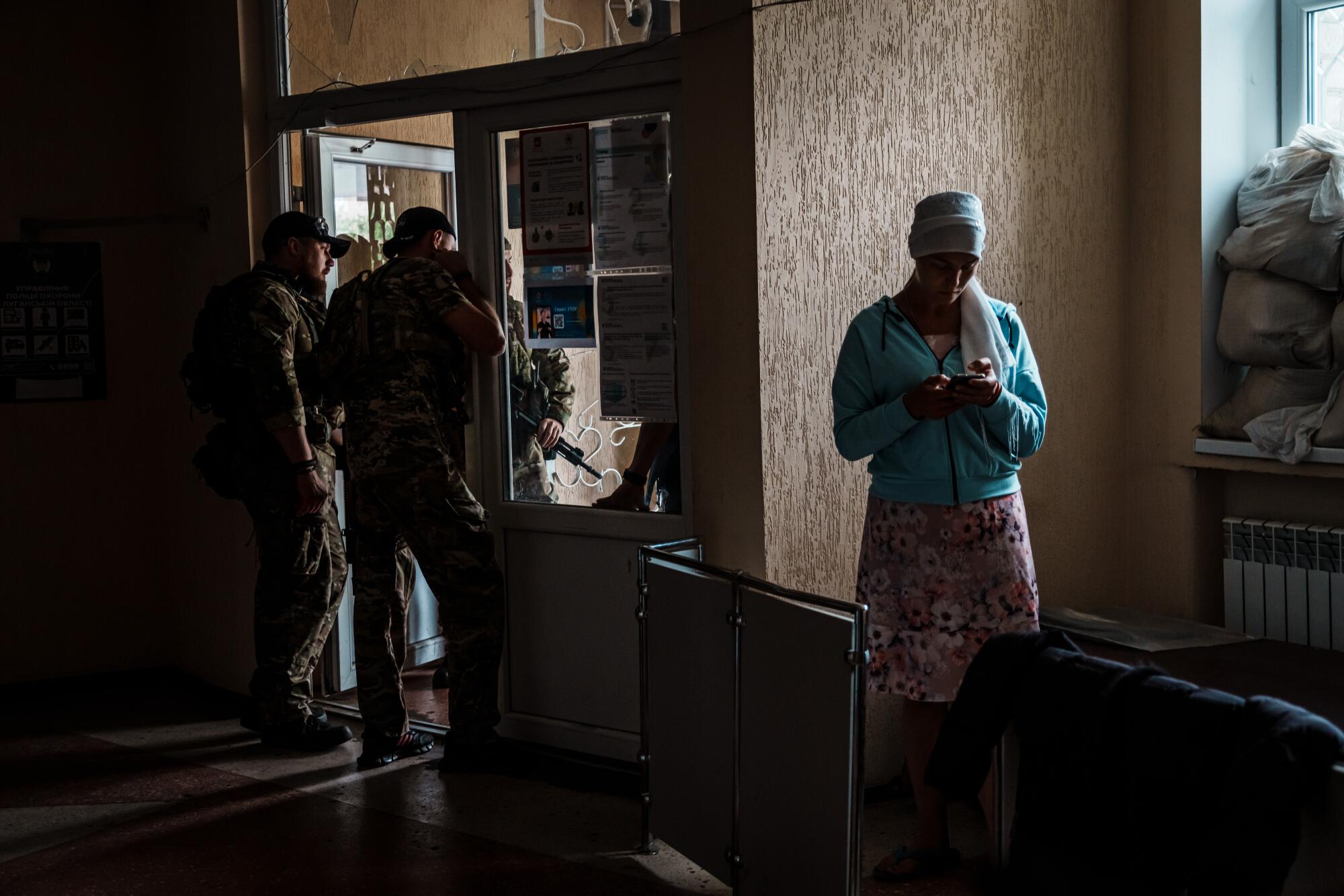
But that’s not how it turned out. Instead, hundreds of thousands enlisted to fight the Russians, deluging recruiters from the army and the territorial defense force to the degree that many initially had to be turned away. Those who didn’t carry guns worked with agencies or on their own to prepare food and medical supplies, not to mention Molotov cocktails, for the defense of their cities.
The Times’ Marcus Yam is back in eastern Ukraine, where fighting remains fierce and residents continue to endure with no end in sight.
In places where the Russians did manage to enter, such as the Kyiv suburbs of Bucha and Irpin, some residents who didn’t evacuate acted as informers, providing Ukrainian forces with information on the location and movements of those they derided as “occupiers.” When the Russian troops were forced to retreat, they undertook bloody purges that saw them rape, kill and torture their way to vengeance against the unfriendly population. (Moscow denies its forces engaged in the killings.)
That inhospitable environment probably played a role in the Kremlin shifting its calculus and retreating from areas around the capital and several other major cities. But even where the Russians have held ground and tried to govern, as they have in the southern province of Kherson, they face a grudging resignation to their rule that flares up on occasion with acts of defiance, from protests to sabotage.
Yet in many cities and towns around the eastern Ukrainian region known as the Donbas, including Lysychansk and its sister city Severodonetsk, it’s the Ukrainian forces who often face sullen acceptance of their presence.
“They’re turning Ukraine into a giant military base,” said Tanya, a diminutive woman standing in the backyard of the building where she was sheltering. As Ukrainian artillery opened up with another salvo somewhere nearby, she glanced at a group of soldiers in the garage of the building next door.
Tanya, an accounting systems programmer in her 50s, said she had a reason to hate the Ukrainian government: Some of its fighters had beaten her husband to death at a checkpoint in 2014, when Russia-backed separatists seized parts of the two eastern provinces, Donetsk and Luhansk, that make up the Donbas.
“Of course we’re worried about them,” she said of the soldiers. “Everyone has a gun.”
There were others nearby who agree. One of Tanya’s neighbors, another woman in her 50s, asked whether her disabled son could be evacuated — not to safer areas in Ukraine but instead to Russian-held territories.
And during a visit to the last remaining hospital in Severodonetsk last month, military doctors there said they often treated casualties among the residents who considered them the enemy, not the Russians.
“They say it was the Ukrainian army who did this to them. They can’t even bring themselves to answer when we say ‘Slava Ukraini,’ or glory to Ukraine,” said Vitaly Mikhailovich, a 32-year-old general surgeon. “It’s hard for us to deal with this attitude, where you’re trying to save their lives and they still don’t support their country.”
Such sympathies have morphed on occasion to outright collaboration, said Luhansk Police Chief Oleh Hryhorov, who said about 50 people have been arrested for providing information to the Russians.
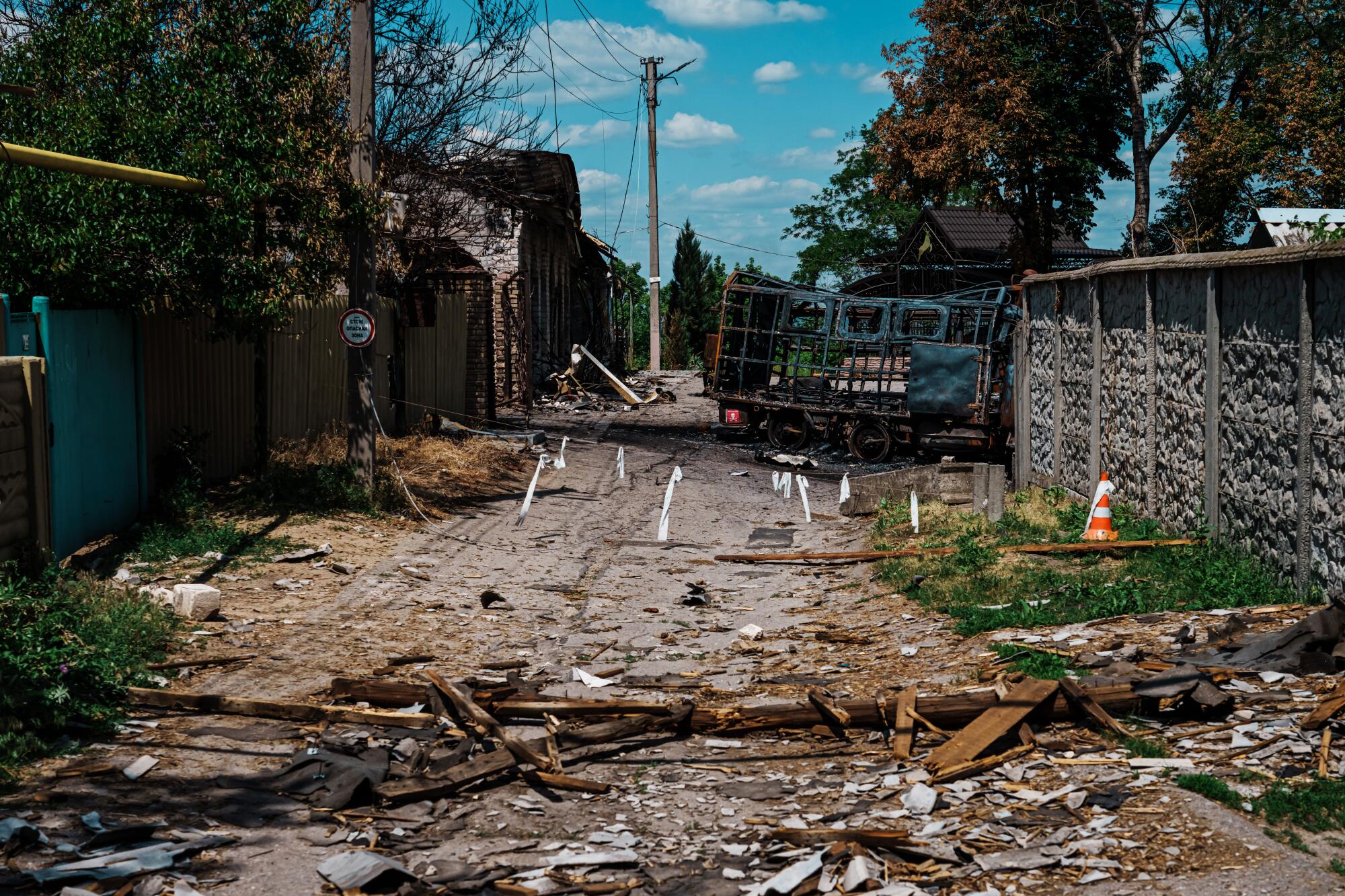
That there are some Russian sympathizers in the area comes as little surprise, said Lysychansk Police Chief Volodymyr Zolotaryov, 46, a trim man with salt-and-pepper hair.
“The first factor is that the Russian border is so close, and many people have relatives and links on the other side,” he said. He added that, historically, coal mines and other industries drew workers from Russia to settle in the Donbas.
“Of course, you have some of the older people, they’re thinking about pensions and cheap gas from Russia.”
Besides, with the population in Lysychansk dwindling to fewer than 15,000 people from a high of more than 100,000 before the war, those who have remained are likely to have pro-Russia leanings. For weeks now, Lysychansk and Severodonetsk have had no electricity, gas, water or phone signal. Although most of the people staying in such difficult circumstances said they were too poor to go anywhere else, or couldn’t bring themselves to abandon a beloved family member or even their pets, it seemed clear that among them are those sanguine about Moscow rule.
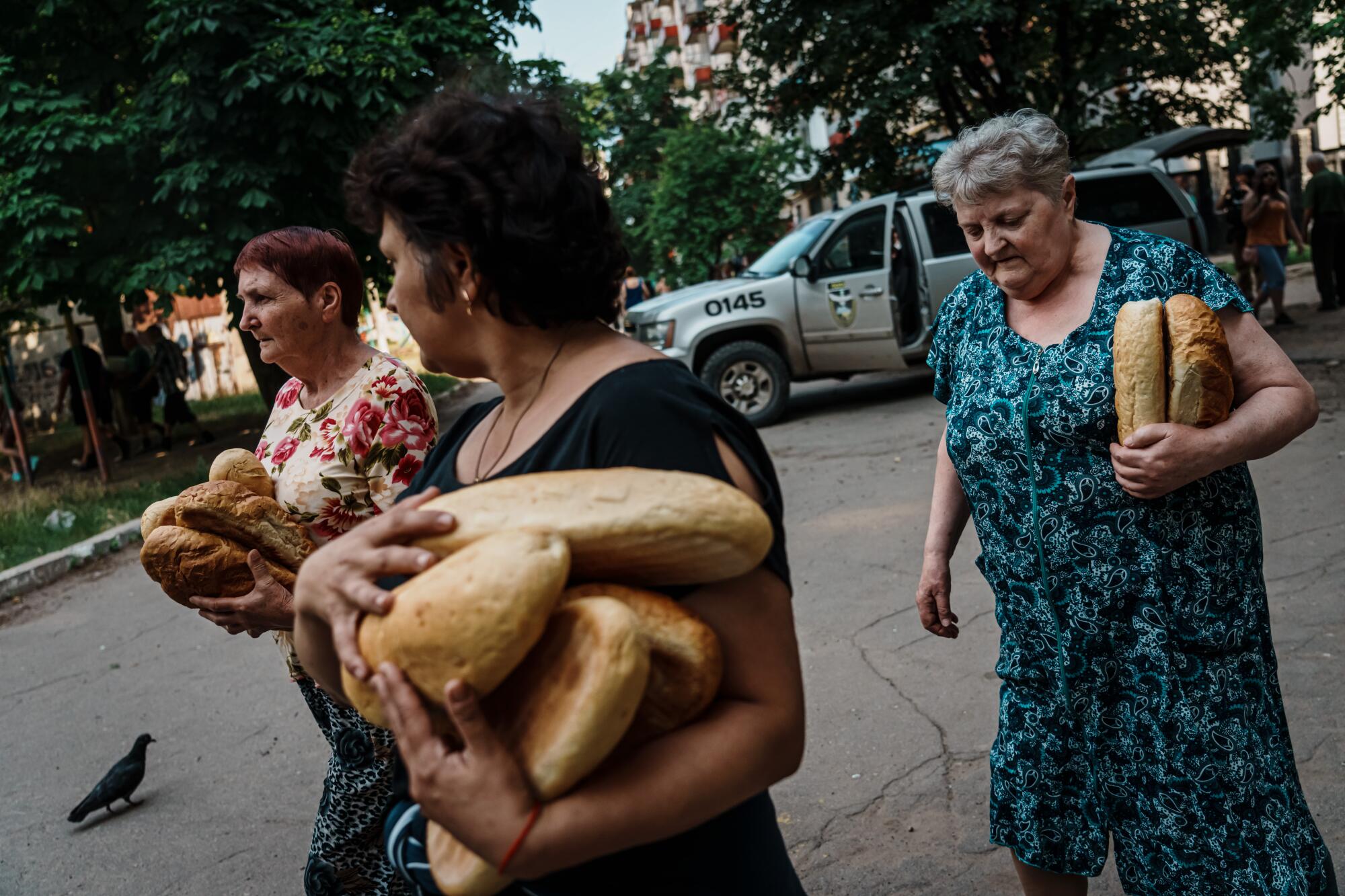
“We see these people every day, but we know they’re just waiting for Russians and would support them,” said Vasil, a policeman from western Ukraine staffing a checkpoint on Lysychansk’s southern edge. “Today they talk to us. But tomorrow, they’ll talk to the Russians.”
Pro-Moscow media often feature interviews with residents in territories seized by Russian forces, exhorting them to express their relief at being been freed from Ukrainian usurpers. One video late last month depicted a group of people in Severodonetsk celebrating the Russians’ arrival with vodka; one man played guitar.
Some residents harbor resentment toward the Ukrainian military because they know their presence would probably draw Russian artillery fire. Some complained that Ukrainian soldiers were commandeering apartment buildings for their positions even when they were in a residential area.
At a lookout point on a hill in Lysychansk across from Severodonetsk, where Russians have all but encircled Ukrainian defenders, two women came out of one of the houses and shouted at Ukrainian soldiers and visiting journalists to leave. The soldiers cursed at them and told them to move away; they acquiesced, but one of them left with a parting shot when told that the soldiers’ job was to defend them.
“Our defenders?” she said, nodding toward the obliterated front of a restaurant that had been struck by a shell. “Look at how they’re defending us.”
More to Read
Sign up for Essential California
The most important California stories and recommendations in your inbox every morning.
You may occasionally receive promotional content from the Los Angeles Times.
